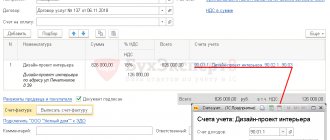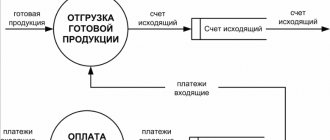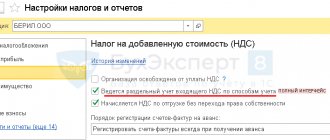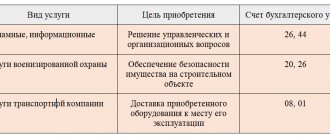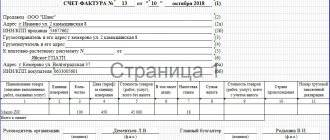In this material we will look at the provision of services - accounting entries. We will find out how services are reflected in accounting, how services are accounted for by the customer/performer, as well as what are the features of the provision of services by an agent. We will answer frequently asked questions and analyze common mistakes.
A service is a type of activity that cannot be expressed materially. Its results are provided to individuals and legal entities for a fee or are used in the course of business activities within the company.
Types of services
When providing any type of service, the parties to the transaction are:
- Service Seller,
- Consumer (customer).
Services are: (click to expand)
- Legal;
- Auditing;
- Informational;
- Transport;
- Educational;
- Storage services;
- Communication services (telephone, postal, Internet provider);
- For leasing premises, fixed assets, inventories, etc.;
- Medical services in various medical centers. institutions;
- Services in trade (work of consultants with clients, merchandisers for displaying goods, etc.);
- Other types of services.
The main document issued upon completion of the service is the Service Provision Certificate. Also, companies paying VAT draw up an invoice. Read also the article: → “Free accounting programs on the simplified tax system”
Conclusion
Services have a number of important features: they are intangible, they cannot be stored, and consumption occurs directly at the time of provision.
This leads to the rules for accounting for services. In most cases, the contractor has no overhead costs or work in progress. But sometimes, when providing services, it is necessary to organize production accounting.
The customer can attribute the amount of the purchased service directly to costs or the cost of goods and materials at the time of receipt.
Provision of services - accounting entries: how services are reflected
In accounting, services provided are recognized as expenses based on primary accounting documents:
- Agreement between the contractor and the customer;
- Acts on the provision of services;
- Other documents proving the fact of acceptance of the results of the service.
The company's profits and expenses from the sale of services must be taken into account by the accountant when the orders are actually executed; Until the customer accepts the work and puts his signature on the supporting papers, cash receipts or expenses cannot be taken into account.
The Ministry of Finance has its own opinion regarding the execution of the act - it should be drawn up when:
- this is specified in the agreement;
- this is required by the Civil Code (namely, if a construction contract was concluded, the fulfillment of obligations under other construction contracts can be confirmed by other acceptance documents);
- For tax purposes, a firm using the accrual method is required to recognize material costs under a contract for production services.
Options for replacing the work completion certificate:
- a copy of the consignment note (transportation services),
- the same document and, in addition to it, a tear-off coupon for the waybill (transportation services with an hourly rate),
- commission agent's report (commission services),
- attorney's report (by agreement of assignment),
- agent's report (when concluding an agency agreement).
If we are not talking about a construction contract or other type of work for which the drawing up of an act is mandatory, it is possible to provide in the contract an additional condition, according to which the work will be recognized as completed in full in the absence of claims from the client. Then the paper proving the fulfillment of obligations can be:
- the contract itself,
- payment document,
- invoice for payment.
Impact of Cost Accounts on Accounting Areas
The purpose of accounting implies the generation of two main types of reports:
Form No. 1 - “Balance”. The report shows the state of the enterprise at a point in time. Indicators of this state are two types of information: what the company owns (Assets) and debts/liabilities (Liabilities) of the company.
Form No. 2 - “Report on financial results” (profit and loss statement). The report shows Profit/Loss for main and non-core activities for the period.
Accounting areas that are all interconnected work to achieve accounting goals. A change in one area or account will certainly result in a change in another area. Most changes affect the final accounting results. Cost accounts are no exception.
The main “influences of cost accounts” on areas of accounting: 1. Incorrect assignment of a cost item to a specific account. 2. The incorrect formulation of the cost item was chosen, which resulted in an erroneous attribution to the formation of the cost of production. 3. An incorrect or suboptimal method was used to transfer the collected costs to the main production to obtain the full cost of the product or work. 4. Changes in the amounts of primary documents in previous periods when the financial result was calculated.
Accounting entries for the provision of services and performance of work
Accounting entries are represented by the following transactions:
| DEBIT | CREDIT | Reflection of the operation |
| Income from the provision of services is revenue: | ||
| 62 (76, 50) | 90-1 | Revenue from the sale of works/services is reflected |
| For companies requiring advance payment for work: | ||
| 51 (50) | 62 s/sch. “Calculations for advances received” | Received partial (full) prepayment for upcoming work/services |
| 62 s/sch. “Calculations for completed work (services)” | 90-1 | Revenue from the sale of works/services is reflected |
| 62 s/sch. “Calculations for advances received” | 62 s/sch. “Calculations for work/services performed” | Prepayment credited |
| Costs are the cost of work performed and implementation costs: | ||
| 90-2 | 20 | The cost of work/services sold is taken into account as expenses |
| 44 | 05 | Depreciation accrued on intangible assets |
| 44 | 02 | Depreciation has been calculated on fixed assets |
| 44 | 60 (76) | Received invoices for services (facility security, rent, utility bills...) |
| 44 | 10 | Materials written off |
| 44 | 70 | Salaries accrued to employees of the organization |
| 44 | 69 | Contributions have been accrued for compulsory pension (social, medical) insurance and insurance against accidents and occupational diseases; |
| 44 | 71 | Travel and entertainment expenses have been written off; |
| 44 | 97 | Costs that were previously included in deferred expenses have been written off. |
| At the end of the reporting period, the amounts accumulated on account 44 must be debited to subaccount 90-2 “Cost of sales”: | ||
| 90-2 | 44 | Expenses written off to cost of sales |
| Sometimes expenses are carried forward to future periods: | ||
| 97 | 60 (76) | Costs included in deferred expenses |
| 20 (25, 26) | 97 | Part of deferred expenses is taken into account as part of expenses for ordinary activities |
| If a company engaged in the sale of services and works is a VAT taxpayer: | ||
| 90-3 | 68 s/sch. “VAT calculations” | VAT is charged on the sale of work or services |
| 51 (50) | 62 s/sch. “Calculations for advances received” | Received partial (full) advance payment from the buyer for upcoming work/services |
| 76 s/sch. “Calculation of VAT on advances received” | 68 s/sch. “VAT calculations” | VAT is charged on the prepayment amount |
| If income and expenses are taken into account as work stages are completed: | ||
| 46 | 90-1 | The stage of work paid for by him was handed over to the customer |
| 90-2 | 20 | The cost of the completed and paid stage of work is taken into account in expenses |
| 90-3 | 68 s/sch. “VAT calculations” | VAT accrued on the completed stage of work |
| 62 | 46 | Reflects the cost of work paid by the customer (after completion of all work) |
Reflection of the sale of services in accounting
All expenses related to the provision of work and services are usually classified as expenses for ordinary activities.
Distinguish between: (click to expand)
- depreciation expenses;
- social payments needs;
- employee salary expenses;
- material costs;
- and others.
Direct (main) costs are those that are directly related to the production process (salaries, insurance payments, etc.).
Indirect (overhead) costs are those incurred in the course of managing and maintaining the company (depreciation, management salaries, utilities, rent, etc.).
Which costs will be recognized as direct and which as indirect, the enterprise decides, based on the specifics of the activity.
In relation to the provision of various services and the performance of work, the “Custom-made” cost calculation method is applicable, when all costs are calculated for a specific order or a set of similar orders. For each of them, a card is created indicating the order No., the work being carried out, and the timing of its completion. Expenses are recorded as obligations under the contract are fulfilled.
Accounting for services from the contractor: postings
Accounting for a service company depends on the type of activity and the chosen tax system. Revenue from the performance of work or provision of services represents income from ordinary activities.
| Income accounting | ||
| Debit | Credit | Operation |
| 62 | 90.1 | The implementation of work is reflected |
| 90.3 | 68 | VAT calculated |
| 90.2 | 20 (43, 26, 25, 23) | Write-off of the cost of work performed |
| 62.1 “Settlements with buyers and customers” | 90.1 “Revenue” | Revenue from sales of services/works |
| 51 “Current account” | 62.1 | Payment for services/work |
| Expense accounting | ||
| The company provides services, and no material investments are required. | ||
| 20 “Production costs” | Accumulation of expenses | |
| 90.2 | 20 | Write-off of costs in the cost of sales of services |
| The company performs work while producing material assets. | ||
| 20 “Production expenses”, 26 “General operating expenses”, 25 “General operating expenses” | Cost accounting | |
| 43 “Finished products” | Accounting for manufactured objects | |
Results
Accounting for services is based on accounting standards. The accounting methodology is specific and depends on the specific type of activity of the performing company. Revenue from the provision of services is included in income from ordinary activities. Expenses are recorded as costs from normal activities in cost accounts. In the production of material assets necessary for the performance of services, finished product release account 43 is used.
For the customer, the cost of services is recognized as an expense and is charged either to cost accounts or to an increase in the purchase price of assets for which these services are related.
Sources:
- Tax Code of the Russian Federation
- Civil Code of the Russian Federation
- Federal Law of December 6, 2011 N 402-FZ “On Accounting”
You can find more complete information on the topic in ConsultantPlus. Free trial access to the system for 2 days.
Accounting for services at the customer: postings
In order to correctly determine the account on which the customer’s expenses will be reflected, you need to take into account what the services provided by a third-party organization were aimed at:
- If for work in auxiliary production - invoice. 23 or count. 25;
- if for the production of goods - account. 20;
- if to ensure the functioning of the administrative apparatus - account. 26.
| DEBIT | CREDIT | Operation |
| 60 | 51 | Settlements with the contractor are reflected |
| 44, 20, 23, 25, 26 | 60 | Services received are included in expenses |
| 19 | 60 | Input VAT highlighted |
The debit account is determined based on the specifics of the service provided.
Accounting
In accounting, reflect settlements under civil contracts on account 76 “Settlements with various debtors and creditors”, even if the contract was concluded with an employee (Instructions for the chart of accounts). In this case, account 70 “Settlements with personnel for wages” cannot be used. It is intended only for conducting settlements with employees regarding wages; in this case, the performer cannot be recognized as an employee.
Determine the corresponding account based on the nature of the work (service):
Debit 20 (23, 29) Credit 76
– remuneration was accrued under a civil contract for work performed (services provided) for the needs of the main (auxiliary, servicing) production;
Debit 25 (26) Credit 76
– remuneration was accrued under a civil contract for work performed (services provided) for general production (general economic) needs;
Debit 44 Credit 76
– remuneration has been accrued under a civil contract for work performed (services provided) related to the sale of products, goods, works and services. In trade organizations, the debit of account 44 can reflect the accrual of all remunerations under civil contracts for work performed (services rendered);
Debit 08 Credit 76
– remuneration was accrued under a civil contract for work performed (services provided) for the construction (installation, reconstruction) of fixed assets;
Debit 91-2 Credit 76
– remuneration has been accrued under a civil contract for work performed (services provided) not related to production and sales (for example, services for organizing recreation and entertainment);
Debit 91-2 Credit 76
– remuneration was accrued under a civil contract for work performed (services provided) to eliminate the consequences of emergency events;
Debit 91-2 Credit 76
– remuneration was accrued under a civil contract for work performed (services provided) at the expense of net profit with the consent of the owners of the organization.
Reflect the payment of remuneration by posting:
Debit 76 Credit 50 (51, 52…)
– remuneration was paid under a civil contract.
This procedure follows from the Instructions for the chart of accounts.
Provision of services by an agent
An agency agreement is an agreement concluded between the customer company (principal) and a third party (agent) for the provision by an agent of intermediary services for the sale or purchase of goods or services for a certain fee.
The main difference between such an agreement and a standard service agreement is that the agent is paid in the form of a percentage of the amount of contracts concluded by him due to the fact that the essence of the agency agreement is to represent the interests of the enterprise.
The document confirming the provision of the service is the agent’s report , drawn up in any form. It is usually compiled every month. Among other things, the report indicates the cost of the agent’s work, which includes his expenses in the course of fulfilling his obligations under the contract. Read also the article: → “Accounting and tax accounting of employee bonuses. Postings and examples”
The agent has the right to restrict the employer from hiring other performers of the same task that is assigned to him and from taking any actions (until the goal is achieved) in relation to the work specified in the agreement between them. The employer may require the agent not to enter into contracts with his competitors.
There are several types of agency agreements:
- For transport services (accompaniment of goods at each stage of transportation);
- for the provision of accounting services (customers usually assume payment for the customer’s services through an agent);
- for the provision of legal services (search for a legal defender, ensuring work with documentation);
- customer search services.
Agent's accounting entries:
- Money received by an agent for work is recognized as income from ordinary activities and is reflected in the account. 90 sec. “Revenue.”
- The agent's expenses in the course of fulfilling obligations under the contract are reflected in the account. 26 “General business expenses”, the amount will be written off to the account. 90 sec. “Cost of sales.”
Principal's accounting entries:
- Revenue is indicated on the account. 90.
- Payment for the agent’s work based on the report he provides will be reflected in the account. 26.
- Expenses for agent services will be written off to the account. 90.
- Income received as a result of the provision of services by the agent is included in the account. 51.
- The customer will also reflect the VAT amount.
Personal income tax
Withhold personal income tax from payments to citizens under civil contracts for the performance of work (rendering services), since in this case the organization is recognized as a tax agent (subclause 6, clause 1, article 208 of the Tax Code of the Russian Federation, article 226 of the Tax Code of the Russian Federation, letters of the Ministry of Finance of Russia dated 13 January 2014 No. 03-04-06/360 and November 7, 2011 No. 03-04-06/3-298).
And even if the civil contract stipulates that the personal income tax must be paid by the citizen himself, the organization will not be relieved of the duties of a tax agent, since such terms of the contract will be void (Article 168 of the Civil Code of the Russian Federation, letters of the Ministry of Finance of Russia dated December 28 2012 No. 03-04-05/10-1452 and dated April 25, 2011 No. 03-04-05/3-292).
Withhold tax on payments to both residents and non-residents. At the same time, withhold personal income tax from payments under a civil contract to a resident contractor if he received income both from sources in the Russian Federation and from sources outside of Russia. Personal income tax on payments to non-residents for performing work (rendering services) must be withheld only if the citizen received income from sources in the Russian Federation. If income is received by a non-resident from sources outside of Russia, do not withhold personal income tax. Such rules are established by Article 209 of the Tax Code of the Russian Federation.
Also, do not withhold tax if the agreement is concluded with an entrepreneur, notary or lawyer. Entrepreneurs and notaries pay personal income tax on their own (clause 2 of article 227 of the Tax Code of the Russian Federation). Lawyers who have established a law office also pay personal income tax on their own (clause 2 of article 227 of the Tax Code of the Russian Federation). In other cases, tax is withheld from the income of lawyers by bar associations, law offices or legal consultations (clause 1 of Article 226 of the Tax Code of the Russian Federation).
In accounting, reflect the deduction and transfer of personal income tax to the budget with the following entries:
Debit 76 Credit 68 subaccount “Personal Income Tax Payments”
– personal income tax is withheld from remuneration;
Debit 68 subaccount “Personal Income Tax Payments” Credit 51
– transferred to the personal income tax budget.
Personal income tax must be transferred to the budget at the place where the organization is registered.
What if we are talking about income from civil contracts entered into by a separate division? Then the personal income tax must be transferred according to the details of the tax office in which this unit is registered.
This procedure is provided for in paragraph 7 of Article 226 of the Tax Code of the Russian Federation.
For payments to residents for performing work (providing services), calculate the tax at a rate of 13 percent (clause 1 of Article 224 of the Tax Code of the Russian Federation).
Withhold personal income tax from payments to non-residents at a rate of 30 percent. The exception is non-residents who are recognized as highly qualified specialists. Regardless of their tax status, their income will be taxed at a rate of 13 percent. This is stated in paragraph 3 of Article 224 of the Tax Code of the Russian Federation. When calculating personal income tax for residents, take into account the professional tax deduction (clause 3 of Article 210 of the Tax Code of the Russian Federation). Do not provide a deduction to non-residents (clause 4 of article 210, clause 3 of article 224 of the Tax Code of the Russian Federation).
Situation: is it possible to provide standard tax deductions for personal income tax to residents working under civil contracts?
Yes, you can.
When providing a standard tax deduction, restrictions on the type of contract (labor or civil) are not provided for in Article 218 of the Tax Code of the Russian Federation.
A person has the right to receive a standard tax deduction for himself and (or) his child. A deduction for yourself in the amount of 3000 or 500 rubles. provide to special categories of citizens. Deductions for a child are provided for in subparagraph 4 of paragraph 1 of Article 218 of the Tax Code of the Russian Federation.
To provide a standard deduction to an employee engaged under a civil contract, an organization must fulfill the following conditions:
- obtain from the employee all the necessary documents (clause 3 of Article 218 of the Tax Code of the Russian Federation);
- determine the size of the standard tax deduction that can be provided (clause 1 of article 218 of the Tax Code of the Russian Federation).
Provide deductions to an employee hired under a civil contract only for those months during which the contract is valid. When deciding whether to provide a standard deduction for children, the income received by the employee from the beginning of the tax period (year) is taken into account.
Similar conclusions follow from letters of the Ministry of Finance of Russia dated April 7, 2011 No. 03-04-06/10-81, the Federal Tax Service of Russia dated March 4, 2009 No. 3-5-03/233 and the Federal Tax Service for Moscow dated June 1, 2010 No. 20-15/3/057717.
If the contract is valid for several months, and the remuneration is not paid monthly (for example, in a lump sum upon expiration of the contract), then provide standard tax deductions for each month of the contract, including those months in which the remuneration was not paid. This conclusion follows from letters of the Ministry of Finance of Russia dated January 13, 2012 No. 03-04-05/8-10, dated July 21, 2011 No. 03-04-06/8-175, Federal Tax Service of Russia dated October 9, 2007 No. 04-1-02/002656. This approach is confirmed by the Resolution of the Presidium of the Supreme Arbitration Court of the Russian Federation dated July 14, 2009 No. 4431/09.
An example of providing a standard tax deduction under a civil contract concluded with a citizen who is not an employee of the organization
On April 1, Torgovaya LLC concluded with A.I. Ivanov contract for the current renovation of office premises. Ivanov is not an employee of the organization, and is also not registered as an entrepreneur.
The contract was concluded for a period of three months. The amount of Ivanov’s remuneration under the contract is 30,000 rubles. and is paid in a lump sum upon completion of the work.
On June 30, Ivanov handed over the completed work. The organization accepted them according to the acceptance certificate.
The Hermes accountant awarded Ivanov a remuneration of 30,000 rubles. and included its amount in the personal income tax base for June.
Ivanov has one child under the age of 18. According to Ivanov’s statement, this year, before the conclusion of the contract, he did not work anywhere and did not receive any income. Thus, in June, its tax base since the beginning of the year did not exceed 350,000 rubles. Standard deductions were provided to Ivanov in the following amounts:
- 1400 rub. – for April;
- 1400 rub. – for May;
- 1400 rub. - for June.
Personal income tax on Ivanov’s remuneration amounted to 3,354 rubles. ((RUB 30,000 – (RUB 1,400 × 3 months)) × 13%).
In June, Hermes paid Ivanov a reward in the amount of 26,646 rubles from the cash register. (30,000 rubles – 3354 rubles).
An example of how to reflect in accounting remuneration under a civil contract for the performance of work concluded with a citizen who is not an employee of the organization
On March 1, Torgovaya LLC concluded with A.S. Kondratyev contract agreement for routine repairs of office space. Kondratyev is not an employee of the organization, and is also not registered as an entrepreneur.
The cost of work is 41,000 rubles. When performing repairs, Kondratiev uses materials from the organization.
In March, Kondratiev renovated the office space. The Hermes accountant, on the basis of the acceptance certificate for the work performed, accrued remuneration to Kondratiev in the amount of 41,000 rubles.
The amount of the remuneration was included in Kondratiev’s personal income tax base for March. Kondratiev has one child under the age of 18. According to Kondratyev’s statement, this year before the conclusion of the contract, he did not work anywhere and did not receive any income. Thus, in March, its tax base since the beginning of the year did not exceed 350,000 rubles. Therefore, he is provided with a standard tax deduction for a child in the amount of 1,400 rubles. Personal income tax amounted to 5148 rubles. ((RUB 41,000 – RUB 1,400) × 13%).
In March, Hermes paid Kondratiev from the cash register in the amount of 35,852 rubles. (RUB 41,000 – RUB 5,148).
The accountant made the following entries in the accounting:
Debit 44 Credit 76 – 41,000 rub. – repair work performed by Kondratyev under a contract was accepted;
Debit 76 Credit 50 – 35,852 rub. – remuneration was paid to Kondratiev under the contract;
Debit 76 Credit 68 subaccount “Personal Income Tax Payments” – 5148 rubles. – personal income tax was withheld from remuneration accrued in favor of Kondratiev;
Debit 68 subaccount “Personal Income Tax Payments” Credit 51 – 5148 rub. – transferred to the personal income tax budget, withheld from Kondratiev’s income.
To learn whether it is necessary to withhold personal income tax from the cost of materials, transportation or other expenses that the organization compensates to the contractor under a civil contract in addition to remuneration, see On what income to withhold personal income tax.
Include remuneration (advance) under a civil contract for the performance of work or provision of services in the tax base for personal income tax on the day of payment of the remuneration (advance) in cash or in kind (clause 1 of Article 223 of the Tax Code of the Russian Federation). In this case, it does not matter in which tax period the work will be performed (services provided). That is, the tax must be withheld on the day of actual payment of income, regardless of whether this payment is an advance payment or final payment under the contract. Similar conclusions follow from the letter of the Ministry of Finance of Russia dated January 13, 2014 No. 03-04-06/360.
If a person receives remuneration in cash, transfer the calculated personal income tax to the budget no later than the day following the day the income was paid. This is provided for in paragraph 6 of Article 226 of the Tax Code of the Russian Federation.
If a citizen receives remuneration in kind, withhold the calculated tax from any monetary rewards paid to him (Clause 4 of Article 226 of the Tax Code of the Russian Federation). If personal income tax cannot be withheld, notify the tax office at the place of registration of the organization, as well as the citizen to whom the income was paid (clause 5 of Article 226 of the Tax Code of the Russian Federation).
Situation: is it necessary to withhold personal income tax from the income of a non-resident from whom an organization leases equipment used in Russia? The lessor is registered in the Republic of Belarus as an individual entrepreneur.
Yes need.
Income from the rental of equipment located on the territory of Russia is recognized as income from sources in Russia (subclause 4, clause 1, article 208 of the Tax Code of the Russian Federation). As a general rule, such income for a non-resident is subject to personal income tax at a rate of 30 percent (clause 1 of Article 207, clause 3 of Article 224 of the Tax Code of the Russian Federation). In this case, the amount of personal income tax must be withheld from the income of a non-resident and transferred to the budget by the Russian organization that pays income to a citizen of the Republic of Belarus, since in this case it is a tax agent (clause 1 of Article 226 of the Tax Code of the Russian Federation). The fact that a citizen of the Republic of Belarus is registered in this country as an individual entrepreneur does not matter in the situation under consideration. The fact is that a foreign citizen registered as an entrepreneur in another state in accordance with its national legislation, for the purpose of calculating personal income tax in Russia, has the status of an individual.
At the same time, Article 7 of the Tax Code of the Russian Federation establishes the priority of the norms of international treaties of Russia over the norms of the Tax Code of the Russian Federation. Currently, there is an agreement between the Government of the Russian Federation and the Government of the Republic of Belarus dated April 21, 1995 “On the avoidance of double taxation and the prevention of tax evasion in relation to taxes on income and property.” In accordance with parts 1, 2 and 3 of Article 11 of this agreement, payments in the form of remuneration for the use (granting the right to use) industrial, commercial or scientific equipment, the source of payment of which is the territory of Russia, may be subject to personal income tax both in Russia and in the Republic of Belarus . However, the tax rate in Russia cannot exceed 10 percent.
These payments include, in particular, remuneration for rental (leasing) of equipment. But provided that the equipment is industrial, commercial or scientific. That is, the leased property must meet the following criteria:
- be considered equipment according to the All-Russian Classification of Fixed Assets, approved by Decree of the State Standard of Russia dated December 26, 1994 No. 359 (i.e., included in the “Machinery and Equipment” group, OKOF - 14 0000000);
- be designated in the contract between the Russian tenant organization and a citizen of the Republic of Belarus specifically as industrial, commercial or scientific equipment.
Similar conclusions follow from letters of the Ministry of Finance of Russia dated September 10, 2012 No. 03-08-06/Belarus, dated January 24, 2011 No. 03-08-05. Despite the fact that these explanations are devoted to the relationship between organizations of Russia and the Republic of Belarus, they can be extended to the situation under consideration. Since the provisions of Article 11 of the agreement apply to the taxation of income of both organizations and individuals.
Thus, if an organization leases industrial, commercial or scientific equipment from a citizen of the Republic of Belarus, personal income tax will be withheld at a rate of 10 percent. To confirm the right to apply the 10 percent rate, provide the inspection with confirmation that the non-resident is a tax resident of the Republic of Belarus.
If the leased property used on the territory of Russia is not recognized as industrial (commercial, scientific) equipment, withhold personal income tax at a rate of 30 percent.
Advice: there are factors that make it possible not to withhold personal income tax from the income of a resident of the Republic of Belarus if he is registered in this country as an individual entrepreneur. They are as follows.
As a general rule, when paying income to an individual entrepreneur, the organization is not recognized as a tax agent. An entrepreneur registered in accordance with the legislative procedure must independently calculate and pay tax on income received to the budget. This procedure is established by paragraphs 1 and 2 of Article 227 of the Tax Code of the Russian Federation.
From the provisions of Part 2 of Article 8 of the Treaty of December 8, 1999 “On the Creation of a Union State” it follows that an entrepreneur registered in the Republic of Belarus has the same rights, obligations and guarantees on the territory of Russia as a Russian entrepreneur. Therefore, a Belarusian entrepreneur must independently calculate and pay tax on income paid to him by a Russian organization. Accordingly, the Russian organization is not recognized as a tax agent in relation to him and should not withhold personal income tax from his income.
This approach is confirmed by arbitration practice (see resolution of the FAS of the North-Western District dated September 9, 2008 No. A56-1937/2008).
If an organization does not withhold personal income tax when paying income to an entrepreneur who is a resident of the Republic of Belarus, this may cause claims from inspectors. And then the organization will have to defend the legality of its actions in court.
Legislative acts on the topic
Legislative acts are represented by the following documents:
| clause 5 art. 38 Tax Code of the Russian Federation | Service concept |
| Letter of the Ministry of Finance of the Russian Federation dated November 13, 2009 No. 03-03-06/1/750 | The opinion of the Ministry of Finance on the need to draw up a certificate of completion of work |
| Art. 720 Civil Code of the Russian Federation | On drawing up a certificate of completion of work only in the case of a construction contract |
| subp. “g” clause 12 and clause 13 PBU 9/99, clause 18 PBU 10/99 | On accounting for income and expenses from the sale of services upon completion of work and provision of services |
| Part 1 Art. 9 of the Law of December 6, 2011 No. 402-FZ, paragraph 1 of Art. 252 Tax Code of the Russian Federation | On the obligation to document the completion of work and provision of services |
| subp. clause 6 clause 1 art. 254, paragraph 2 of Art. 272 of the Tax Code of the Russian Federation, Letter of the Federal Tax Service of the Russian Federation dated December 29, 2009 No. 3-2-09/279 | On the need for an act of service provision to recognize expenses under an agreement for the provision of services to companies using the accrual method |
| Art. 999 Civil Code of the Russian Federation | On proof of provision of services under a commission agreement using a commission agent’s report |
| Art. 1008 Civil Code of the Russian Federation | On proof of provision of services under an agency agreement by presenting an agent’s report |
| para. 5 tbsp. 974 Civil Code of the Russian Federation | On the possibility of proving services under an agency agreement by presenting an attorney’s report |
| Letters of the Ministry of Finance of the Russian Federation dated May 4, 2012 No. 03-03-06/1/226, dated November 17, 2006 No. 03-03-04/1/778 | On specifying in the contract for the provision of services additional conditions under which the service is considered provided if the customer has not made any claims |
| clause 3 art. 168 Tax Code of the Russian Federation | On issuing an invoice to the buyer by a company paying VAT |
| Instructions for the chart of accounts (accounts 51, 50, 62, 90) | On the reflection of income from the provision of services and performance of work |
| Instructions for the chart of accounts, sub. “g” clause 12 PBU 9/99 | On the reflection of expenses for the provision of services or performance of work |
| subp. 1 clause 3 art. 315 Tax Code of the Russian Federation | The fact that costs associated with the implementation of works and services reduce sales revenue (for enterprises on OSNO) |
| clause 9 art. 274, paragraph 7, art. 346.26 Tax Code of the Russian Federation | On the recognition of expenses by the company for OSNO + UTII |
| clause 1 art. 346.29 Tax Code of the Russian Federation | On the impossibility of recognizing expenses when calculating tax by a company on UTII |
| clause 2 art. 346.18 Tax Code of the Russian Federation | On reducing sales revenue when calculating tax by a company using the simplified tax system “Income minus expenses” |
| clause 1 art. 346.18 Tax Code of the Russian Federation | On the impossibility of recognizing any expenses by the company under the simplified tax system “Income” |
| clause 1 art. 252 Tax Code of the Russian Federation | On the need for the expenses taken into account to be economically justified and documented |
| clause 1 art. 272 Tax Code of the Russian Federation | On the recognition of expenses when calculating income tax by a company on OSNO using the accrual method |
| clause 3 art. 273 Tax Code of the Russian Federation | On the recognition of expenses when calculating income tax by a company using OSNO using the cash method |
| Art. 708 Civil Code of the Russian Federation, clause 13 PBU 9/99 | On approval in the contract of phased delivery of long-term works |
Common mistakes
Error No. 1: An attempt to establish a phased scheme for the delivery of work in the contract for construction work.
Comment : A similar procedure for the delivery of work is provided for services not related to construction, in order to reflect them in accounting in different reporting periods. Work related to construction is regulated by PBU 2/2008.
Error No. 2: Reflecting in accounting in a special way the provision of services to a subsidiary.
Comment : Profits and costs from providing services to a subsidiary should be recognized on a general basis once the service has been provided.
Agency fees in accounting for principal and agent
The remuneration of agents in accounting is directly related to the receipt of money, the calculation of VAT, and payment for goods, so the transactions must be considered in their entirety.
The agent's basic invoice correspondence schemes will be below.
This option is used when the agent works directly for the customer. He does not own the goods, he has no income (expenses) from third-party goods and materials (PBU 9/99):
- DT 51 - CT 76 - money was received from the principal to pay for the transaction (including VAT and remuneration).
- DT 76 - CT 90/1 - agency fees are reflected in accounting.
- DT 90/3 - KT 68/2 - VAT on remuneration.
- DT 60 - CT 51 - paid to the counterparty for the MC for the customer.
- DT 76 - CT 60 - agency expenses (reimbursable) are reflected in accounting, including VAT.
Customer goods are accounted for on an off-balance sheet basis - D002. After shipment to the customer, the MC is written off from K002.
The scheme is applied by the agent when he acts as an intermediary:
- DT 62 - CT 76 - revenue according to the contract.
- DT 51- CT 62 - the buyer transferred the money.
- DT 76 - CT 51 - transfer of money for sold goods and materials to the customer (minus remuneration).
- DT 62 - CT 90/1 - the agent’s remuneration is reflected in the accounts.
- DT 90/3 CT 68/2 - VAT on remuneration.
- DT 76 CT 62 - agent’s remuneration to be credited.
Off-balance sheet accounting of inventory items is maintained: D004 – capitalization of inventory items for sale, K004 – sold assets are written off. Accounting for the customer of services, the principal, reflects the other side of the same transaction. The postings are similar to those used for settlements with suppliers, but they also reflect the work of the agent.
The scheme applies if the agent works directly on behalf of those who ordered the services:
- DT 76 - CT 51 - money was transferred to the agent for various purposes (purchase of goods and materials, reimbursement of expenses, remuneration).
- DT 41 - KT 76 - goods were purchased through an agent (remuneration, TZR, is added to the cost of the goods by the same transaction).
- DT 19 - KT 76 - VAT on the purchase price of goods (the same posting takes into account VAT on remuneration, TZR).
- DT 68/2 CT 19 - VAT deductible.
This is how transactions are reflected if the agent works as an intermediary in a transaction:
- DT 51 - CT 62 - money received from the agent (received from the buyer).
- DT 62 - CT 90/1 - revenue from the agent is taken into account (according to the report).
- DT 90/3 CT 68/2 - VAT on revenue.
- D20 (or other “cost” account) - K76 - the agent’s remuneration is taken into account.
- DT 19 - CT 76 - VAT on remuneration taken into account.
- DT 68/2 - KT19 - VAT, deduction.
- DT 90/2 - CT 20 (other “cost” account) - costs for the agent’s services are written off.
- DT 76 - CT 62 - agent's remuneration to be offset.
Question: How to reflect in the accounting of an agent organization transactions for the acquisition of real estate (building) for the principal if, under the terms of the agreement, the agent acts on his own behalf, participates in settlements and receives an agency fee on the basis of 100% prepayment? View answer


